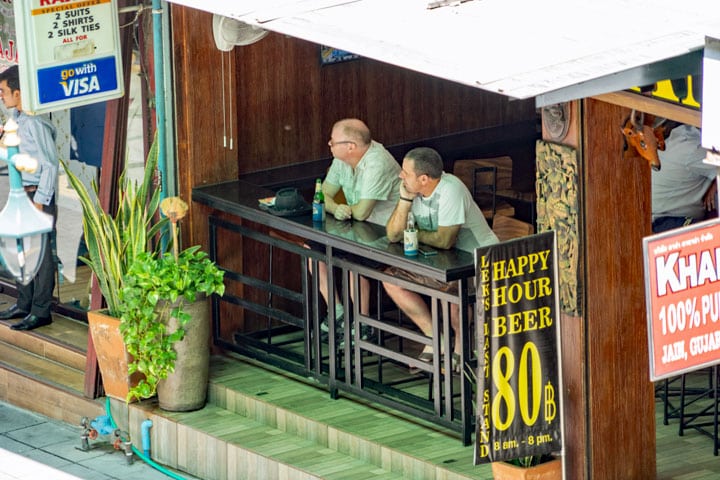Discover Thailand (18): Expats and retirees

Thailand has been an attractive destination for expats for many years. An expat is a person who lives and works abroad temporarily or permanently. Usually an expat moves to another country to work for a company or organization, or to experience a new lifestyle. Some people are expats because they are looking for new challenges or adventures, while others move to be with their partner or family who already live in Thailand.
There are many expats living in Thailand who are often called farang, they come from countries such as the United States, the United Kingdom, Australia, Belgium, Norway, Austria and the Netherlands.
Expatriates often live in countries where the language and culture are different from their home country, and they often have to adapt to new circumstances and challenges. Many of them enjoy the unique experience of living and working in another country, and the chance to get to know and discover new cultures.
Thailand can also appeal to retirees (or “retirees”) due to its low cost of living and wonderfully warm climate. Many retirees choose to move to Thailand because they want to enjoy a comfortable life with a lower budget than what they are used to in their home country.
However, the cost of living in Thailand can vary greatly depending on where you live and how you live. In the big cities, such as Bangkok and Chiang Mai, the costs may be slightly higher than in smaller towns or rural areas. The cost of housing, food, transportation and other living costs may be lower than in some other countries, but this may also depend on an individual's needs and preferences.
How many expats live in Thailand?
It is difficult to say exactly how many expats live in Thailand, as there are no official figures available on the number of expats in the country. According to a 2020 estimate, there are approximately 300.000 expatriates living in Thailand. However, this is probably an underestimate, as the number of expats in the country is constantly increasing. The number of expats in Thailand is probably highest in the capital Bangkok, but many expats also live in other cities and tourist destinations, such as Chiang Mai, Pattaya, Phuket and Koh Samui.
About 20.000 live there Dutch people in Thailand, according to figures from the Dutch embassy in Thailand. However, this number can fluctuate, as some Dutch people live in Thailand temporarily and others live permanently. The Dutch are one of the larger groups of expats in Thailand and can be found in all parts of the country, although most Dutch people live in the urban areas of Bangkok, Chiang Mai, Pattaya and Hua Hin. The Dutch come to Thailand to work, study or enjoy their retirement. Some Dutch people also have their own company in Thailand.
No recent figures are available on the number Belgen who lives in Thailand. According to data from the Belgian embassy in Thailand, there were about 5.000 Belgians in Thailand in 2018, although this number can also fluctuate.
The main reason to move to Thailand
There are many reasons why people move to Thailand from Europe. Here are some of the most common:
- Low costs: Thailand has a lower cost of living compared to some other countries in Asia and Europe.
- Beautiful nature: Thailand has a beautiful landscape with a rich biodiversity, including tropical islands, rainforests, mountains and waterfalls. This makes it attractive to people who love nature.
- Favorable locationg: Thailand is centrally located in Southeast Asia, making it a good base for exploring the region.
- Temperate warm climate: Thailand has a tropical climate with warm temperatures all year round. This makes it attractive to people who enjoy warm weather and who want to escape the cold winters in Europe.
- Welcome expat community: There is a large expat community in Thailand, so it can be easy to make friends and find support.
- Rich culture: Thailand has a rich and diverse culture with a long history and unique traditions. This makes it attractive to people who are interested in other cultures and who want the chance to get to know and experience them.
- Opportunities to work: Thailand has a growing economy with good job opportunities in various sectors, such as tourism, IT and business. This makes it attractive for people looking for work abroad, but there are strict rules for obtaining a work permit.
There are many more reasons why people move to Thailand from Europe. These are some of the most common, but everyone has their own unique reasons and priorities. It is important to research what suits you best before making a decision to move.

Disadvantages of living in Thailand
Like any country, Thailand has both pros and cons for people who want to live and live there. Here are some of the drawbacks people may encounter:
- language barrier: Although many people in the tourist areas and big cities speak English, Thai is the official language of the country. This can be a barrier for people who don't speak Thai and who have trouble making themselves understood.
- Cultural differences: Thailand has a unique culture and customs that may differ from what people are used to. This can sometimes be difficult to adjust and can lead to cultural misunderstandings.
- Unreliable public facilities: Some public utilities, such as water and electricity, can be unreliable in Thailand. This can lead to inconvenience and frustration for people accustomed to better quality of these services.
- Lower quality of healthcare: Although there are good hospitals and clinics in Thailand, the general quality of health care may be lower than in some other countries. This can be a concern for people who need extra medical care.
- Lower safety, especially road safety: Although Thailand is generally a safe country, there are sometimes problems with crime and other safety issues, such as road safety. Road safety is a major problem in Thailand. According to the World Health Organization (WHO), Thailand has one of the highest rates of road fatalities per capita in the world. This can be a cause for concern for people who wish to move to Thailand.
- Environmental problems: Thailand experiences high levels of air pollution, especially in urban areas. The pollution is caused by the emission of particulate matter from vehicles, industries and the incineration of household waste. In the North, the burning of harvest waste and forests cause very poor air quality, resulting in serious health problems.
- Climate change: Thailand is vulnerable to the effects of climate change, such as floods and droughts.
- Corruption: Thailand is known for its high level of corruption. According to Transparency International's World Corruption Perception Index (CPI), Thailand ranks 101st out of 180 countries, indicating that the country has a high level of corruption. Corruption is widespread in Thailand and can manifest itself in a variety of ways, such as taking bribes from government officials, influencing political decisions through corruption, and money laundering.
- Political tensions: Thailand faces political tensions created by its lack of political stability and history of military coups. The main source of political tension in Thailand is the conflict between the royalist elite, who are close to the royal family, and populist political parties that enjoy support from urban and rural populations. This conflict has led to mass demonstrations and violent confrontations in the past. There are also political tensions between different ethnic groups in Thailand. Finally, Thailand is experiencing violent conflict in its southern border provinces, where separatist groups are active. These conflicts have led to violent attacks and armed conflicts with the Thai government. While there have been times when political tensions in Thailand have calmed down, the political climate remains volatile and could escalate quickly.
Which cities are attractive to expats?
There are many cities in Thailand that can appeal to expats depending on their personal preferences and needs. Here are some of the most popular cities for expats in Thailand:
- Bangkok: The capital of Thailand is a modern city with a rich culture and a wide range of work and life opportunities. It is also a cheap city to live in compared to some other major cities in Western Asia and Europe.
- Chiang Mai: This city in the north of Thailand is known for its beautiful nature and low cost of living. It is a popular destination point for expats looking for a quiet and relaxed lifestyle. In the months of January to May, conditions are worse due to air pollution.
- Pattaya: This is a popular resort in Thailand. It is known for its beautiful beaches and nightlife, and it is a cheap city to live in.
- Phuket: This island in the south of Thailand is known for its beautiful beaches and luxurious lifestyle. It is a popular destination for tourists and expats looking for a relaxed beachside lifestyle.
- Hua Hin: This is a popular resort town about three hours from Bangkok. Known for its beautiful beaches and low cost of living, it is a good option for expats looking for a quiet lifestyle close to the capital.

Relations between expatriates and Thai nationals
An important reason why expats settle in Thailand is love and marriage. It is difficult to give an exact number for the number of expats in Thailand who are married to a Thai woman, as there is no central database with this information. There are some data available on the number of marriages between foreigners and Thai partners in Thailand. According to data from the Thai Department of Immigration, there were about 2019 marriages between foreigners and Thais in 25.000. It is also important to mention that the number of marriages between foreigners and Thai partners in Thailand has decreased in recent years. In 2015, there were still about 31.000 marriages between foreigners and Thais in that year, which means that the number has dropped by about 20% in the past four years.
Reasons for expats to leave Thailand again
There are several reasons why expats leave Thailand and return to Europe:
- Personal reasons: some expats choose to return to Europe because of personal or family obligations, such as taking care of parents or starting a family (better education for children). Other reasons may be the end of a relationship or homesickness for the country of birth. Furthermore, issues such as boredom and alcoholism among expats are also serious problems.
- Visa problems: Expats may have problems obtaining or renewing their visa in Thailand, which may lead to the decision to return to Europe.
- Employment opportunities: some expats choose to return to Europe because they can find better paid work or more employment opportunities in their home country.
- Cultural adaptation: For some expats it can be difficult to adapt to the Thai culture, which may lead to the decision to return.
- Economical reasons: The cost of living in Thailand can still be higher than what expats are used to or expected, which can lead to financial problems and the decision to return.
- healthcare: Healthcare in Thailand can sometimes be limited, which may lead to the decision to return to Europe where better healthcare is available. For many expats, health insurance is very expensive, some are even uninsured.
Competition from other countries
There are also other countries in Southeast Asia that may be attractive to expats. Here are some examples:
- Vietnam : This country is known for its diverse landscapes, low cost of living, and major cities such as Ho Chi Minh City and Hanoi.
- Malaysia: this country is popular for its mix of modern cities and beautiful nature, such as the Cameron Highlands and the Taman Negara.
- Indonesia: this country is known for its beautiful beaches, such as Bali, and the diverse cultures and languages that exist there.
- Philippines: This country is known for its beautiful beaches, friendly people and low cost of living.
Before you take the step
There are a few things you should consider before moving to Thailand:
- Visa: You must ensure that you have the correct visa to live and possibly work in Thailand. There are several visa options available, so it's important to research which one best suits your situation.
- Employment opportunities: If you plan to work in Thailand, you must first find a suitable job because your employer must arrange a work permit.
- Financial considerations: You must ensure that you have sufficient financial means to live and pay for your insurance.
- Home: You need to make sure you have suitable housing to live in before moving to Thailand. This can mean that you rent or buy a house or apartment. There is quite a bit of noise pollution in Thailand so be prepared for that if you want to buy a house.
Thailand can be an attractive country to live in as an expat due to its low cost of living, beautiful weather, and friendly locals. Some expats describe Thailand as a “paradise” because of these factors.
However, Thailand, like any other country, also has its challenges. Some expats may have trouble adjusting to Thai culture or feel bored. In addition, you will always remain a foreigner, you may be faced with discrimination. In addition, visa issues or the affordability of health care may deter some expats.
In general, Thailand can be an attractive country to live in as an expat, but it is important to be realistic about what to expect and to carefully consider whether the country is right for you before moving there.


Dear Editor,
thanks for this very informative post.
A great addition to the things you already knew. Man never knows enough for these kinds of important steps.
My gratitude